Have you ever heard someone say "elbows up" and wondered what exactly they meant? Perhaps it sounded like a call to action, or maybe a bit of a warning. It's a phrase that, you know, carries a certain kind of punch, and it's got a story that goes way beyond just a simple physical motion. This expression, often heard across Canada, holds a lot more weight and meaning than you might first think, truly capturing a spirit of readiness and resilience.
For many, this phrase might bring to mind images of a hockey game, a sport where players often need to protect themselves or, well, stand their ground. And that's actually a pretty good starting point, because the phrase really does have its roots firmly planted in the rough-and-tumble world of ice hockey, a place where being prepared for anything is just part of the game.
But here's the thing, it's not just for the ice rink anymore. Over time, "elbows up" has sort of grown, expanding its reach into everyday conversations and even, surprisingly enough, into political discussions. It's a versatile little phrase, you see, that can be used to express a whole lot of different ideas, all pointing back to that core notion of being ready and, perhaps, standing up for yourself.
Table of Contents
- The Core Idea: Protection and Readiness
- From the Ice: Hockey's Influence
- Beyond the Rink: Everyday and Political Use
- "Elbows Up" in Other Areas
- Why This Phrase Resonates
- Frequently Asked Questions About "Elbows Up"
The Core Idea: Protection and Readiness
At its very heart, "elbows up" means to protect yourself or to fight back. It's a straightforward message, really, about being prepared for a challenge or a confrontation. When someone tells you to put your elbows up, they're basically saying, "Be ready to defend your position," or "Don't let anyone push you around."
This expression, you know, is used in sports like hockey and boxing. In those settings, it generally means that someone should be ready for a fight and prepared to hit back. It's about a physical readiness, a stance that shows you're not going to be easily moved or defeated. It's a way of saying, "I'm here, and I'm ready for whatever comes my way."
It's not just about throwing punches, though. It's also about a certain kind of mental preparedness, a mindset that says, "I am going to stand my ground." So, it's pretty much a call to be alert and to not be caught off guard, which is, honestly, a good thing in many situations.
From the Ice: Hockey's Influence
It's no shocker that Canadians are using this phrase, because the phrase originates from hockey. This is where the term really, you know, took shape. In ice hockey, players often need to use their bodies to shield the puck, create space, or, quite simply, protect themselves from opposing players who are, well, trying to get the puck or score a goal.
The act of raising your elbows in hockey can be an effective way to protect yourself from an opposing player. It helps you keep your balance, ward off checks, and generally make yourself a more difficult target to move. So, it's a very practical maneuver on the ice, a way of playing with a lot of body presence and, you know, a certain kind of physical assertiveness.
This physical aspect of the game, this need for players to be tough and resilient, really gave birth to the phrase. It's a testament to the sport's physicality and the kind of grit it demands from its participants. You can pretty much imagine a coach yelling it from the bench, encouraging a player to, you know, really dig in and play hard.
Gordie Howe: The Legend Behind the Phrase
The phrase "elbows up" is very, very much linked to hockey legend Gordie Howe. He was known for his style of play, which involved a lot of physical presence. Gordie Howe was, you know, a player who wasn't afraid to get into the thick of things, and he used his body, including his elbows, to great effect on the ice.
He was known for his ability to score goals, but also for his toughness and his willingness to, you know, really battle for the puck. So, the phrase became a command to play with physicality in ice hockey, just like Gordie Howe himself played. It's a way of saying, "Play hard, play tough, and don't back down," which, honestly, sums up a lot of what made him such a remarkable player.
His playing style, in a way, embodied the spirit of "elbows up." It wasn't just about being aggressive; it was about being smart, protecting yourself, and making sure you were always in a position to succeed, even when things got, you know, a little bit rough. He was a true legend, and the phrase, pretty much, lives on because of players like him.
Beyond the Rink: Everyday and Political Use
While its roots are deep in hockey, "elbows up" has, you know, really branched out. It's become a phrase that people use in all sorts of situations, far removed from the ice. It's a testament to how language evolves, how a specific term can take on a broader, more metaphorical meaning over time, which is kind of neat when you think about it.
This phrase can be used to express a general readiness to face a challenge, to be assertive, or to protect one's interests. It's about being vigilant and not allowing yourself to be taken advantage of. So, you might hear it in a business meeting, or in a discussion about, you know, standing up for your rights, which is pretty cool.
It's a very Canadian thing, in some respects, to take a phrase from their beloved sport and apply it to, you know, broader life situations. It speaks to a certain national character, a kind of resilience and a willingness to, you know, stand up for what they believe in, which is actually a pretty admirable quality.
Mike Myers and a National Rallying Cry
What came out of the tariff threats was the expression "elbows up," which was heard from all kinds of Canadians. This phrase gained a lot of public attention, you know, during a time of political tension between Canada and the United States. President Donald Trump's tariffs, for instance, really stirred things up.
Canadian comedian and actor Mike Myers may have started a movement by pointing to his elbow and mouthing the words 'elbows up' on SNL on March 1st. This moment, you know, really resonated with many Canadians. It was a simple gesture, but it carried a powerful message, a kind of unspoken encouragement to, you know, be strong and unified.
In this context, it sounds like Mike was, you know, using the phrase to encourage Canadians to stand up to the United States. It became a rallying cry to protect the nation's interests. It was a pretty clever way to use a familiar phrase to convey a strong political sentiment, and it pretty much caught on like wildfire among the population.
"Elbows Up" in Other Areas
The phrase "elbows up" is commonly used across multiple disciplines, you know, beyond just hockey and politics. It shows how a simple physical action can have, you know, such broad applicability. It's pretty much a versatile concept that translates well into different areas of life, which is kind of interesting.
For example, you'll find it in fitness, where keeping your elbows up might be crucial for proper form in certain exercises. In dance, it can refer to a specific posture that helps with balance and grace. In martial arts, it's, you know, a fundamental part of a defensive or offensive stance, helping to shield vital areas.
And even in everyday posture adjustments, the idea of "elbows up" can be relevant. It can mean sitting or standing tall, with your shoulders back and your chest open, which, honestly, conveys a sense of confidence and readiness. At its core, it refers to a physical readiness, a position that suggests you are alert and, you know, prepared for action.
Why This Phrase Resonates
So, why does "elbows up" resonate so much with people, particularly Canadians? Well, it's, you know, a phrase that carries a lot of implied strength and resilience. It's simple, yet it conveys a deep message about standing your ground and protecting what matters to you, which is, honestly, a very powerful idea.
It speaks to a certain kind of toughness, a willingness to face adversity head-on. It's a reminder that sometimes, you know, you need to be assertive and not let others push you around. This idea of being ready for anything, of having a defensive posture both physically and metaphorically, is something that many people can, you know, relate to.
The connection to hockey, a sport deeply ingrained in Canadian culture, gives it an extra layer of meaning and familiarity. It's a phrase that, you know, evokes images of determination and national pride. It’s pretty much a call to action, a way to encourage people to be strong, resilient, and, you know, ready for whatever comes their way, just like a hockey player on the ice.
Frequently Asked Questions About "Elbows Up"
What is the main meaning of "elbows up"?
The main meaning of "elbows up" is to protect yourself or to fight back. It pretty much means being ready for a challenge, standing your ground, and not letting others push you around. It's about having a defensive posture and a prepared mindset.
Where did the phrase "elbows up" come from?
The phrase "elbows up" originates from ice hockey. It's a term that describes an effective way for a player to protect themselves from an opposing player, often associated with the physical style of play of hockey legend Gordie Howe. So, it's pretty much a hockey term that grew into something more.
How was "elbows up" used in a political context?
In a political context, "elbows up" became a rallying cry for Canadians, particularly during discussions about President Donald Trump's tariffs. Canadian actor Mike Myers, for example, used the phrase on SNL to encourage Canadians to stand up to the United States and protect their national interests. It was, you know, a way to express a unified stance.
Learn more about Canadian idioms on our site, and link to this page Understanding Cultural Expressions.



Detail Author:
- Name : Dr. Thurman Greenholt
- Username : damien.prosacco
- Email : considine.marcella@stokes.com
- Birthdate : 1991-11-28
- Address : 677 Parisian Plains Apt. 306 Swiftshire, NH 62196
- Phone : +1 (717) 541-6746
- Company : Block, King and Kassulke
- Job : Textile Dyeing Machine Operator
- Bio : Amet est quis non ullam. Aliquam expedita et occaecati assumenda officia. Et temporibus et et itaque.
Socials
tiktok:
- url : https://tiktok.com/@jerrellhaley
- username : jerrellhaley
- bio : Et odit ratione rerum consequuntur et est. Cumque fugiat cumque eos quos.
- followers : 4116
- following : 2794
facebook:
- url : https://facebook.com/jerrell_xx
- username : jerrell_xx
- bio : Quos id et voluptas rerum aliquam occaecati velit.
- followers : 5524
- following : 201
linkedin:
- url : https://linkedin.com/in/jerrell_haley
- username : jerrell_haley
- bio : Earum quidem et aliquam beatae id est hic.
- followers : 3660
- following : 861

